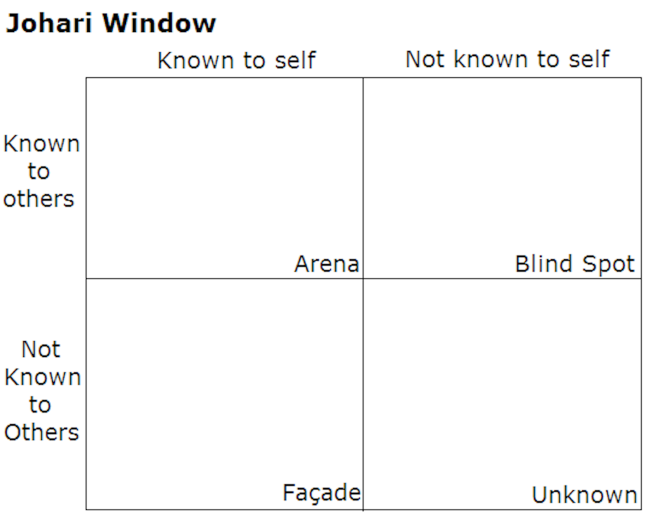 Communication is a tricky thing. Every day we walk the gauntlet between an intended message and an interpreted message. When there is disparity between the two misunderstandings and disharmony can arise.
Communication is a tricky thing. Every day we walk the gauntlet between an intended message and an interpreted message. When there is disparity between the two misunderstandings and disharmony can arise.
The first step to improving communication is to examine the ways in which you relate.
Self-awareness can provide great insight to your strengths and weaknesses.
Below is a relational exercise called The Johari Window that was developed by American Psychologists Joseph Luft and Harry Ingham.
It contains four quadrants that represent your self-awareness and awareness from others.
OUR DIFFERENT SELVES
The Arena is the self that is well known to you and to others. It is your public self.
The Blind Spot is the self that is well known to others but not to you.
The Façade is the self that is well known to you but concealed to others – your secret self.
The Unknown is the hypothetical or possible self, not realized in you or known to others.
Here are the provided adjectives. Carefully choose five or six for each quadrant. Ask for some feedback from those close to you to fill in your blind spot. Be prepared to hear some surprising things about yourself. Be careful not to make this a destructive exercise. The whole point is to enhance communication. Take constructive criticism on board – it might be painful but it will help you develop as a person.
THE POSITIVE
Able, accepting, adaptable, bold, brave, calm, caring, cheerful, clever, complex, confident, dependable, dignified, energetic, extroverted, friendly, giving, happy, helpful, idealistic, independent, ingenious, intelligent, introverted, kind, knowledgeable, logical, loving, mature, modest, nervous, observant, organized, patient, powerful, proud, quiet, reflective, relaxed, religious, responsive, searching, self-assertive, self-conscious, sensible, sentimental, shy, silly, spontaneous, sympathetic, tense, trustworthy, warm, wise, witty.
THE NEGATIVE
If you can take criticism, try adding the Nohari window (Kevan Davis 2006) that explores the negative rather than positive personality traits. These adjectives are: –
Violent, insecure, hostile, needy, ignorant, blasé, embarrassed, insensitive, dispassionate, inattentive, intolerant, aloof, irresponsible, selfish, unimaginative, irrational, imperceptive, loud, self-satisfied, over dramatic, unreliable, inflexible, glum, vulgar, unhappy, inane, distant, chaotic, vacuous, passive, dull, timid, unhelpful, brash, childish, impatient, panicky, smug, predictable, foolish, cowardly, simple, withdrawn, cynical, boastful, weak, unethical, rash, callous, humorless
This exercise can unlock any inflexible perceptions about ourselves in relationship. When we experience difficulties in communicating self-exploration is a good place to start.

